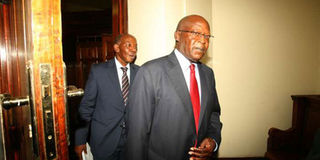We should put the Tunoi saga in context

Supreme Court Judge Philip Tunoi (front) with his lawyer Fred Ngatia at the Supreme Court of Kenya in Nairobi on February 1, 2016 for the special hearing by the Judicial Service Commission on allegations that he received Sh200 million bribe to rule in favour of the Nairobi Governor Dr. Evans Kidero in an election petition against Ferdinand Waititu. PHOTO | EVANS HABIL
What you need to know:
- It is imperative that we place Justice Philip Tunoi’s saga in the context of the country as a whole and where it is going, complete with its many inextricably interconnected cogs, and not just in the context of the Supreme Court and the Judiciary.
- We should dwell on the historical to help give us context: the chequered Moi era coupled with the trials and tribulations of the multiparty era; the first decade of this century which was at first one of great hope and which resulted in a lot of disappointment; and the current decade under the new Constitution which brought with it key checks and balances and new democratic institutions and again a lot of hope.
It is imperative that we place Justice Philip Tunoi’s saga firmly in the context of the country as a whole and where it is going, complete with its many inextricably interconnected cogs, and not just in the context of the Supreme Court and the Judiciary.
First there is the intertwined political, social and economic framework.
We should dwell on the historical to help give us context: the chequered Moi era coupled with the trials and tribulations of the multiparty era; the first decade of this century which was at first one of great hope and which resulted in a lot of disappointment; and the current decade under the new Constitution which brought with it key checks and balances and new democratic institutions and again a lot of hope.
Amongst these, we have devolution and the requirement to subject those who aspire for public office to an accountable recruitment process, to name but two.
Gone, or certainly a lot less, do we see people appointed because they are of a certain ethnic background or because they have managed to access the coterie of the ruling elite.
We are now seeing the building and gradual strengthening of institutions. At the same time all, regardless of whether they be executive, elective and representative, or public officers are subject to much more scrutiny and demands for accountability.
We saw a very thorough process conducted for the post of Governor of the Central Bank of Kenya and Dr Patrick Njoroge has become a stubborn guardian of the fiscal and monetary responsibilities of that office.
NEGATIVE EXPOSURE
We have seen much positive and negative exposure of central and devolved governments and what they are actually doing or not doing correctly. The latter range from how much the NYS paid for ballpoint pens to what some county officials have spent on junket trips abroad.
But, and it is a big but, when we reflect on where we are today we see the corrosive, arrogant and often confident hallmark of corruption and fraud virtually everywhere.
The overall impact on every single one of us is as terrible as it is debilitating. It increases our costs of day to day life, makes us spend more negative energy battling with a system that should work a lot better and overall reduces our standards and quality of living. To put it another way it increases the burdens on our backs.
The Tunoi saga is not just about the Supreme Court or the Judiciary. It is about the rule of law and justice in the country . Everyone or entity involved is entitled to a sane, working and equitable rule of law.
That obligates the guardians of it, such as the relevant arms of government, and in particular the Kenya Police Service and the Judiciary, to literally carry out their tasks to the letter, no more and certainly no less.
MASSIVE OPERATION
The Judiciary is a massive operation spanning from the Supreme Court in Nairobi to the Appeal Court in Malindi to the Magistrate’s Court in Mandera.
Let’s be clear on something here. Yes, the number of cases the courts are hearing have increased. The pile up of pending cases may have been checked. But has the quantity been at the expense of the quality? Has true justice been compromised?
I ask this because I have seen how so few people have faith in our justice system and will do virtually anything to avoid it.
I was once charged with a minor traffic offence and duly appeared at the relevant court the next day. To my astonishment many others who were charged were not there. Why?
The outgoing Chief Justice Willy Mutunga is certainly a man of probity. But how well did he manage the massive administrative demands of his job?
Another question is how much of what we have been hearing and witnessing in the past few weeks is just the tip of the Judiciary iceberg? All this points to the judicial system needing a sea change.
Robert Shaw is an economic and public policy analyst





